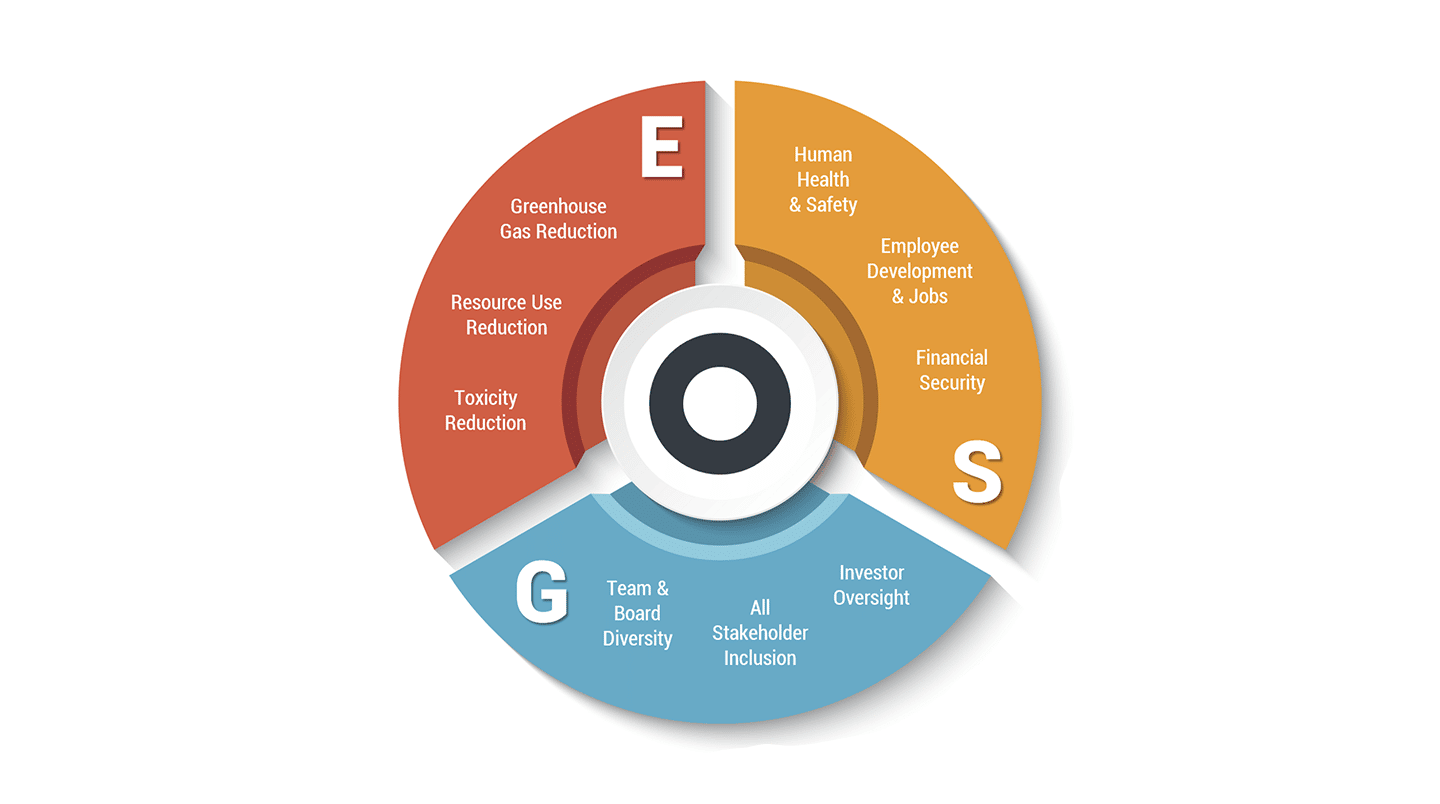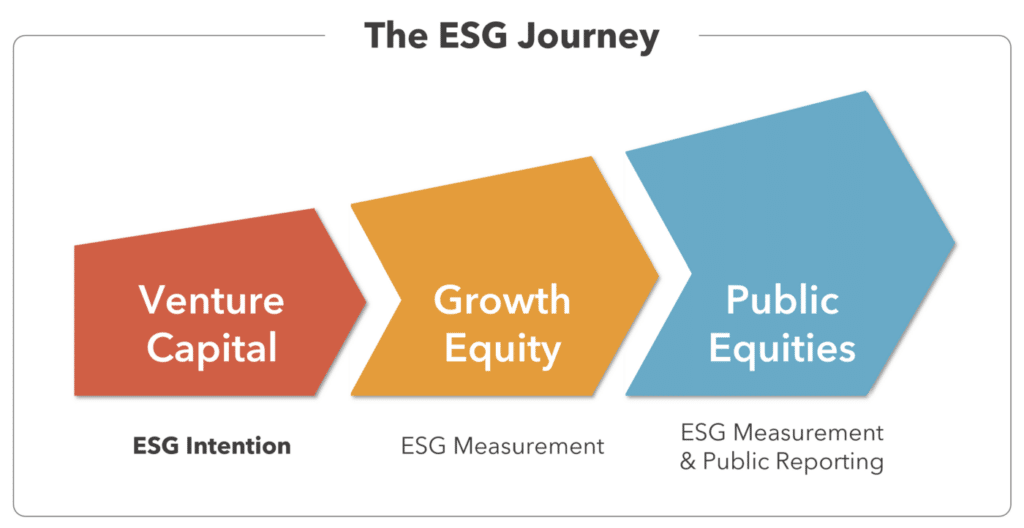The ESG Term Sheet
The 2022 Sequel to the World Positive Term Sheet
James Joaquin |

In 2014, we founded Obvious Ventures on a simple belief that the most valuable companies of our time will be the ones solving humanity’s biggest problems. Five years ago, we created the World Positive Term Sheet to align founders and investors around a company’s intention to deliver social and/or environmental impact. The response was overwhelmingly positive and helped shine a light on the importance of values alignment between founders and investors.
Over the last five years we have been fortunate to see some of our portfolio companies grow from early-stage investments all the way to public market listings. During that journey, we’ve seen increasing excitement and acceptance of Environmental, Social, and Governance (ESG) practices in investing, with the meaning behind those three letters changing substantially across investment stages.
In public markets, ESG factors are used for risk analysis and reporting, as well as a filtering mechanism for building mutual funds and exchange-traded funds (ETFs). In growth equity, meaningful ESG measurement is occurring around late-stage companies that have measurable areas such as greenhouse gas emissions and diversity metrics across their lines of business. In contrast, ESG for early stage venture capital is largely undefined, with the language of Venture ESG still being written.
This article is our effort to open-source our approach to ESG in venture investing. In our eight years of world positive investing at Obvious, we have tested various approaches that have informed and refined our lens. Here are our key findings:
- Values alignment between founders & investors matters
Founders light up when we ask them about their purpose, their values, and their north star—why they are building their startup. Our CEOs consistently tell us that the why matters—it focuses their day to day operations and supercharges their team recruiting and retention.
Dr. Iman Abuzeid, Co-founder and CEO of Incredible Health, reflected back on the importance of mission and purpose in this 2018 interview:
“Before the money was in the bank [from Obvious Ventures], James [Joaquin] asked us to write down our values. I thought it was going to be a trivial exercise, but it turned out to be one of the most meaningful things we’ve ever done. The World Positive Term Sheet was part of it.”
That inquiry around purpose and impact, which began with the World Positive Term Sheet, has evolved into our ESG Intention framework detailed below.
- ESG measurement is unsuitable for early-stage startups
Before recommending an ESG assessment for our portfolio, we take it ourselves. We learned with the B Impact Assessment that the majority of questions simply don’t apply to a startup with less than ten employees. Given that ESG as a field was first developed for public markets (and that early-stage startups often don’t have a product, service, or mature enough organization to “assess”) this is understandable.
At Obvious we invest in companies with positive environmental and/or social benefits directly associated with their core business vs. second or third order effects. At the early stages, when the company is often pre-revenue, it is fundamentally too early to measure the real world impact of future products or services.
But doesn’t Obvious perform ESG measurement? Yes of course. We publish our award-winning World Positive Report at the end of each year. In that report, we highlight our portfolio companies using bespoke storytelling to showcase their impact in ways that match their business and their industry.
In many ways this is the opposite of an ESG framework, trying to fit all companies into a single rubric of measurement. Most importantly, we do the creation work ourselves to celebrate, not burden, our hard-working founders.

- ESG is a journey starting with intention
For early stage venture capital, we believe that the ESG lens begins with one word: intention. As companies grow, they naturally morph into a business with measurable environmental, social, and governance impact, and can deploy ESG measurement frameworks at that point. Some will make it all the way to public markets, hopefully with strong governance and reporting via their listing on The Long Term Stock Exchange (https://ltse.com/listings/listings-overview).

At the beginning of the journey, the DNA of the company’s purpose begins with the founders’ intention around the why and the how of the time machine they’re building. Understanding that intention is our way of forecasting the future environmental and social benefits of the company.
Here’s how we do it.
ESG evaluation
In our due diligence process, we focus on nine areas of inquiry to build our internal evaluation of ESG intention:
Environmental
- Greenhouse gas reduction
We evaluate how the company’s products or services will reduce, replace or remove greenhouse gas emissions including carbon dioxide, methane, nitrous oxide, and ozone; this spans a range of climate tech from renewable energy production to carbon capture.
- Resource use reduction
We evaluate how the company will reduce the resources required to make/distribute products or services (e.g., efficient or automated manufacturing processes, localized production, higher quality control, material reuse or upcycling, etc.)
- Pollution / toxicity reduction
We evaluate how the company will materially reduce or eliminate pollution and toxic outputs; this includes new manufacturing processes and new material science.
Social
- Improve human physical & mental health
We evaluate how the company will improve peoples’ physical and mental health in ways that drive better health outcomes at lower costs for patients. We also consider improved safety in the work and the home.
- Employee development & job creation
We evaluate how the company will develop employee skill sets, create new employment opportunities (beyond positions at the company), and/or provide meaningful assistance to small businesses.
- Improve financial security & safety nets
We evaluate how the company will improve access and affordability of essential financial services; this includes financial planning, savings, and lending, as well as safety nets such as insurance.
- Team & board diversity
We evaluate both the current level of diversity in the company’s leadership team, as well as their specific plans to increase team and board diversity in the near future.
Governance
- All stakeholder inclusion
We evaluate how the company delivers tangible value to all stakeholders including employees, supply chain partners, and the local communities where it operates.
- Investor Oversight
We evaluate the checks and balances provided by investors and board members. Where applicable, we utilize our board role to provide oversight and monitor progress on ESG goals.
ESG Term Sheet language
At Obvious, we’ve made ESG Intentionality a standard part of every term sheet we issue by including the following language:
Obvious is committed to its environmental, social and governance (ESG) goals. In accepting an investment from Obvious, the Company commits to working with Obvious to develop appropriate ESG goals and policies consistent with our dedication to these values and appropriate for the Company.
Our goal is to align with our founders as early as possible in the investment process around a shared goal of integrating ESG practices into the DNA of the startup. At the same time, we are careful to not be overly prescriptive; the timing and implementation of ESG policies can vary depending on the stage of the startup and the team resources available.
As an active member of the National Venture Capital Association, we are also working with their legal advisory board to consider inclusion of an ESG paragraph similar to the one above in a future revision of the NVCA Model Term Sheet.
ESG monitoring
After we have successfully identified values alignment with the founders, ESG intention in the core business, and ultimately purchased shares in a startup and become an investor, our real ESG work begins.
Starting with the ESG Term Sheet, our goal is to partner with our portfolio companies to build the right ESG systems at the right stage of the business. As board members, we try to regularly evaluate progress toward ESG goals at the board level. We encourage founders to create an ESG policy early in the life of a startup. And throughout this journey, we never forget the why—to build transformative companies that create solutions to humanity’s biggest problems. Together we can create long-term value for both shareholders and society.



